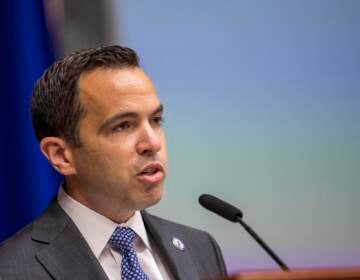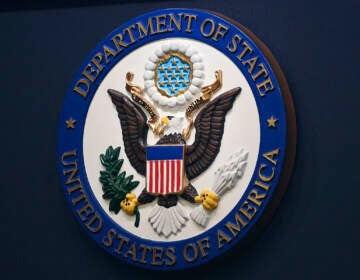After record lows, Pa. refugee resettlement agencies welcome a new presidential agenda
Refugee resettlement agencies welcome coming changes to refugee and immigration policies.

FILE - In this May 15, 2017, file photo, protesters hold signs during a demonstration against President Donald Trump's revised travel ban, outside a federal courthouse in Seattle. Refugee advocates, including faith-based groups that President Donald Trump is courting in his re-election bid, called on Congress Thursday, Oct. 1, 2020, to halt his administration’s plans to slash the limit on refugees allowed into the U.S. to a record low, saying it goes against America’s values. (AP Photo/Ted S. Warren, File)
By next summer, one type of immigration that has been nearly choked off by the Trump administration could be returning in strength to Pennsylvania: refugee resettlement.
After the Trump administration reduced U.S. refugee arrivals to record lows and banned people from certain countries, president-elect Joe Biden has vowed to increase the number of refugees moving to the United States annually to 125,000 people, a number not seen since the mid-1990s.
Refugees and the organizations that work to bring them here celebrate the upcoming change in administration.
“I am really extremely happy about this,” said Rezwan Natiq, a 33-year-old from Afghanistan who resettled to the Philadelphia area with his wife and children in 2019. He fled his home country after working for U.S. armed forces there, a job that made him a target for Taliban attacks.
Natiq still talks monthly with former colleagues in Afghanistan who are in line to be resettled, but are still waiting for a spot. He said he feels more confident now that he will be able to see them again in the not-too-distant future.
“I hope that after January next year, they get all their visas approved and hopefully I will be able to visit them in the United States” at some point, he said.
Local resettlement agencies, which had to wind down or pivot operations during the last four years, welcome the change but say it will take tremendous resources and planning to ramp up operations again.
“We’re obviously pretty excited, kind of like the sun is rising in the United States again,” said Cathryn Miller-Wilson, executive director of HIAS Pennsylvania, a non-profit which resettles refugees in Philadelphia.
A long and “needlessly complicated” road to resettlement
Big changes to U.S. refugee policies came within the first few days of the Trump Administration in January 2017, as President Donald Trump fired off a series of executive orders aimed at reshaping the immigration system.
First, he issued the travel ban, which barred anyone from seven countries from coming to the States for any reason. It also paused all refugee arrivals, so that the administration could study vetting procedures and, if needed, enhance them. At the end of that, new regulations were rolled out which “needlessly complicated” the already thorough process, said Margaret O’Sullivan, executive director of Nationalities Service Center.
Prior to the Trump administration refugees already underwent “more rigorous” screenings and security checks than any other visitors to the United States, according to the previous administration.
The executive branch also has broad powers to set a ballpark figure on how many refugees can come, called the presidential determination.
The Trump administration dropped that ceiling year over year, capping new arrivals at just 15,000 nationwide for fiscal year 2021, which started in October, the lowest number since the modern refugee resettlement to the U.S. began.
In Pennsylvania, that led to a decline in the number of refugees moving here from 2,698 in the first year of his presidency, to 460 in the most recent fiscal year, according to Pennsylvania’s Department of Human Services. The coronavirus pandemic also depressed arrivals this year, said resettlement agency staff. Refugees are placed through faith-based organizations operating in five regions around the commonwealth: Philadelphia, Allentown/Scranton, Harrisburg/Lancaster, Erie and Pittsburgh.
Since refugee resettlement agencies are reimbursed based on the number of people they serve, this drop led to sweeping budget cuts. NSC lost a million dollars in a single year, said O’Sullivan, and has turned to philanthropy and donors to make up for some of its losses.
On the ground in Pennsylvania, these agencies, which find housing, jobs, and help set-up new arrivals in an unfamiliar country with schools and doctor’s appointments, had to redeploy or let go of staff.
“We were working with about nine staff [in 2016]… through death by a thousand cuts, we whittled that down” to one full-time staff person,” said O’Sullivan.
Bethany Christian Services, another agency, stopped working in Philadelphia all together, one of about 120 sites that shut down across the country. It continues to serve and resettle refugees in Lancaster.
HIAS Pennsylvania moved staff into different positions.
To ramp back up requires not only resources, but rebuilding relationships with landlords and employers, said service providers.
“We’re very lucky to be in a City like Philadelphia” where the administration and residents are welcoming, said Gretchen Shanfeld, NSC’s director of operations and quality assurance.
“We’ve seen a spike in our volunteer applications,” she said.
Before stepping foot on a plane to the United States, refugees must first be identified and vetted by a cadre of U.S. agencies, including the Department of State and the Department of Homeland Security. That work has also been cut back in the last four years, and combined with the scarcity of spots, a backlog in eligible refugees has ballooned. There are 120,000 people waiting in line for possible resettlement to the United States, according to the Wall Street Journal.
To be able to smooth the way forward will take until at least next May, or later, depending on how the coronavirus vaccine is distributed and adopted.
In 2015, NSC began resettling Syran families displaced by civil war. About 50 families arrived before the travel ban stopped new arrivals. Some have been waiting ever since for the opportunity to see, and live near, loved ones.
“We’re going to be able to again help reunite families,” said O’Sullivan.
WHYY is your source for fact-based, in-depth journalism and information. As a nonprofit organization, we rely on financial support from readers like you. Please give today.





